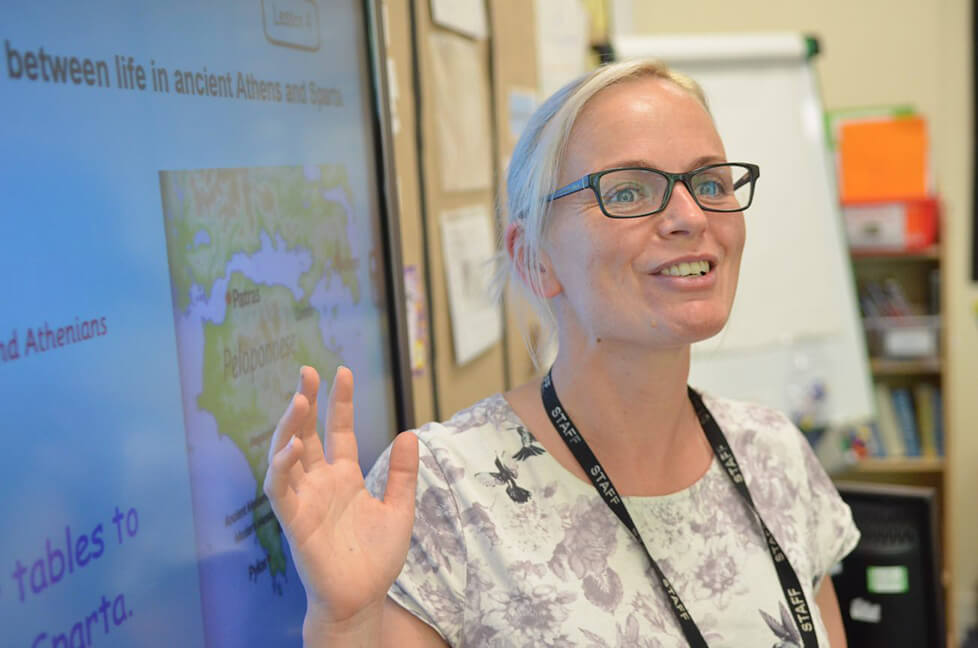Online safety is a growing concern in primary schools
This week, schools and other organisations celebrated Safer Internet Day, an opportunity to educate children on how to stay safe online and be good digital citizens. To mark the event, BBC Teach commissioned a survey of primary school teachers to understand how the internet is affecting their pupils.
Almost all (99.5%) reported that at least one child in their class uses social media. However, the survey indicates that primary school teachers believe social media platforms should do more to protect children, such as making safety controls more accessible and changing the use of algorithms to display particular content. This is unsurprising given that 80% of teachers are aware of at least one safeguarding incident linked to online safety in the last 12 months. A third reported that safeguarding incidents linked to online safety have increased at their primary school.
This year, Safer Internet Day focused on the issue of protecting young people from online scams. A third of primary school teachers say at least one child in their class has reported being a victim of an online scam. Moreover, 35% believe that the number of children being scammed each year is increasing – the same proportion attribute this to the rise of artificial intelligence (AI). Around half say there needs to be better resources to teach children about online scams.
All respondents reported that they cover online safety with their pupils. However, 98% of teachers say they find it challenging to teach. In particular, they find it difficult to stay up to date with online trends and fit online safety lessons into the school timetable. Many also lack confidence on the topic. Sarah Hannfin, head of policy at the school leaders’ union NAHT, says that ‘schools do their best to teach children about online safety – but they are only one part of the solution.’ She calls for the government to establish a national strategy and education programme to raise public awareness and improve online safety.
★ Our IT experts can deliver tailor-made cybersecurity solutions and online safety training to help you keep your school and your pupils safe. Contact us for more information.
Some mental health interventions lead to increased emotional difficulties
Education for Wellbeing, funded by the Department for Education (DfE), was one of England’s largest research programmes testing the effectiveness of school-based mental health interventions. Over 32,000 pupils across 513 schools participated in the programme. Researchers investigated five interventions between 2018 and 2024. One of the interventions, Strategies for Safety and Wellbeing (SSW), was found to improve ‘intended help-seeking for mental health difficulties in primary schools.’ This is an eight-lesson mental health literacy programme, which teaches children how to look after their mental health and when to seek help. Researchers recommend this as an effective intervention for primary schools and say it shows promise for secondaries – but only if it is implemented in full.
However, other interventions were found to have a limited impact on pupils’ mental health outcomes. In many cases, they were found to benefit some students, whilst increasing difficulties for others. For example, relaxation techniques were found to reduce emotional difficulties in primary schools – yet the opposite was true in secondary settings, where frequent use of relaxation techniques was associated with higher levels of emotional difficulties.
One of the interventions trialled was Youth Aware of Mental Health (YAM), which involves five lessons delivered by a trained professional from outside the school, using role play to improve pupils’ understanding of mental health and reduce suicide rates. Unexpectedly, researchers discovered that YAM led to increased emotional difficulties in the long term. Similarly, a six-session mental health literacy programme known as The Guide initially showed improvements in mental health attitudes and behaviours. But in the long term, research indicated it led to increased emotional difficulties and decreased life satisfaction. Therefore, the report concluded that neither of these interventions were recommended for use in schools.
Professor Jess Deighton, Chief Investigator and Director of Applied Research and Evaluation at Anna Freud, says that interventions should form part of a wider, whole-school approach to mental health, which involves ‘supportive relationships and a sense of belonging across the whole school, as well as ensuring more targeted support for those that need it.’
★ Our CPE team consists of HCPC registered psychotherapists and qualified counsellors. With twenty years’ experience working in early intervention and complex casework, our strategies are tried and tested. Reach out to find out how we can help your pupils.
Survey reveals curriculum gaps in readiness for life and the workplace
A new report published by the Higher Education Policy Institute (HEPI) sheds light on how well the current school curriculum prepares young people for higher education and life beyond the classroom.
The majority of students (83%) felt that their school curriculum prepared them well for university, but only 38% believed it adequately prepared them for life and work.
Notably, 63% of students wanted more vocational skills in the curriculum. More than half expressed an interest in more digital and IT skills, whilst 49% called for improved oracy skills. Many favoured a broader curriculum overall, with a third agreeing that studying four or five A Levels or BTECs would give them greater fulfilment and satisfaction than two or three, which was supported by 50% of respondents. However, compulsory English and Maths until age 18 was met with resistance, as 73% and 70% of students, respectively, opposed the idea.
Financial literacy was another key area of concern, with 59% of students expressing a need for more education on finances and budgeting. Additionally, 44% wanted better guidance on career pathways, and 51% wished they had learned more life skills. More positively, the proportion of students who feel well prepared for sex and relationships in higher education has risen to 47%. Yet, a sizeable minority of 28% say they still feel unprepared for this aspect of life.
In light of these findings, the HEPI argues in favour of a broader post-16 curriculum that allows students to take four or five subjects, rather than three. The report calls for ensuring all students reach minimum standards in English and maths, whilst also emphasising digital, oracy, and critical thinking skills and revitalising the creative subjects. Furthermore, the report advocates for a pathways mentor guarantee, ensuring every young person has one-to-one career guidance to make informed post-16 choices. Responding to the report, Sarah Hannfin, head of policy at the school leader’ union NAHT, says the curriculum review is a chance to give ‘all students access to meaningful qualifications across a broader range of academic, arts and vocational subjects.’
This week’s headlines provide valuable insights into the ever-changing world of education, reminding us of our shared mission to ensure young people are not only prepared for exams, but for the complexities of modern life.
At One Education, we are committed to supporting schools and trusts in equipping pupils with the knowledge, skills and confidence they need to flourish – both in the classroom and beyond.
Get in touch to learn how we can help.
Please complete the form below and we will get in contact as soon as we can to help you with your query.














